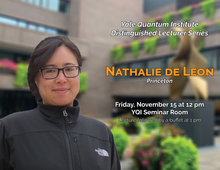Engineering new solid state quantum defects
Engineering coherent systems is a central goal of quantum science and quantum information processing. Point defects in diamond known as color centers are a promising physical platform. As atom-like systems, they can exhibit excellent spin coherence and can be manipulated with light. As solid-state defects, they can be produced at high densities and incorporated into scalable devices. Diamond is a uniquely excellent host: it has a large band gap, can be synthesized with sub-ppb impurity concentrations, and can be isotopically purified to eliminate magnetic noise from nuclear spins. Specifically, the nitrogen vacancy (NV) center has been used to demonstrate basic building blocks of quantum networks and quantum computers, and has been demonstrated to be a highly sensitive, non-invasive magnetic probe capable of resolving the magnetic field of a single electron spin with nanometer spatial resolution. However, realizing the full potential of these systems and systematically discovering new defects requires the ability to both understand and manipulate diamond as a material.
Currently-known color centers either exhibit long spin coherence times or efficient, coherent optical transitions, but not both. We have developed new methods to control the diamond Fermi level in order to stabilize a new color center, the neutral charge state of the silicon vacancy (SiV) center. This center exhibits both the excellent optical properties of the negatively charged SiV center and the long spin coherence times of the NV center, making it a promising candidate for applications as a single atom quantum memory for long distance quantum communication.
Our approach for systematically engineering new color centers in diamond is generalizable to a broader search for quantum defects in many material systems. I will also describe our recent efforts to develop a materials discovery pipeline for rapid screening of new host materials and new defects, including nuclear-spin-free host materials for Er3+, a promising system for quantum networks.
